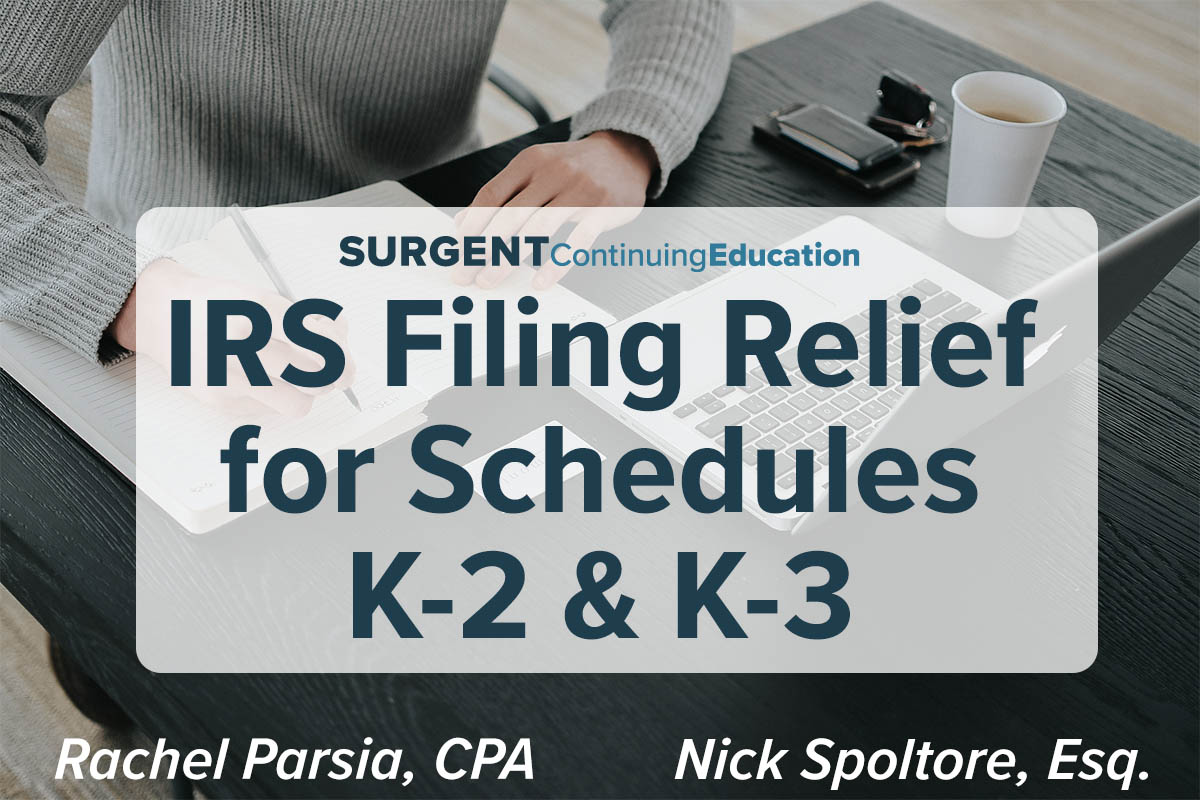
Last year, the IRS announced new Schedules K-2 and K-3 for the 2021 tax year. These schedules were introduced to standardize the reporting of international tax items that were previously reported on Schedule K-1. The IRS published updated instructions for Forms 1065, 1120-S and 8865 on Jan. 18, 2022, stating that entities with no foreign activities may be required to complete Schedules K-2 or K-3 if a partner or shareholder claimed the foreign tax credit and needed information from the entity to complete Form 1116.
Panic ensued until the IRS issued guidance in the form of FAQs on Feb. 16, 2022, to provide filing relief for Schedules K-2 and K-3 for certain domestic partnerships and S corporations. Despite this guidance, practitioners still have lingering questions about filing requirements and transition relief. Below are some important questions and what it means for you and your clients:
1. What are the requirements for filing relief for Schedules K-2 and K-3 in 2021?
Schedules K-2 and K-3 are not required to be filed in tax year 2021 if:
- In tax year 2021, direct partners are not foreign individuals or entities;
- In tax year 2021, the domestic partnership or S corporation does not engage in foreign activity, does not own foreign assets and has not paid foreign tax;
- In tax year 2020, the domestic partnership or S corporation did not report anything in Schedule K-1, Box 16 (Box 14 for S corps) or other foreign-related information, nor did the partners request the information; and,
- The domestic partnership or S corporation has no knowledge that partners or shareholders are requesting such information for the 2021 tax year.
2. Who is considered a foreign partner?
- Foreign partners include foreign partnerships, foreign corporations, foreign individuals, foreign estates or foreign trusts. If an entity is organized under the laws of a foreign country, it is considered a foreign entity. Foreign individuals include nonresident aliens that are not U.S. citizens or resident aliens.
3. What if a partner or shareholder files Form 1116 to claim the foreign tax credit and notifies the partnership or S corporation that they need information contained on Schedule K-3 to complete their return?
- If a partnership or S corporation meets the criteria discussed in Question 1, they qualify for filing relief for Schedules K-2 and K-3 for the 2021 tax year. However, FAQ #15 specifically states that if the partnership or S corporation is notified by a partner or shareholder that this information is needed to complete their tax return, then the partnership or S corporation must provide the information to the partner or shareholder. If the notification occurs before the partnership or S corporation files its return, the conditions for the filing relief are not met and the partnership or S corporation must provide the Schedule K-3 to the partner or shareholder and file the Schedules K-2 and K-3 with the IRS. The IRS has not provided guidance regarding whether an amended return is required if the partnership or S corporation was notified after they already filed their return.
4. What is “foreign activity”?
- The IRS failed to define “foreign activities” in the FAQ filing relief; however, it cites “foreign taxes paid or accrued” and “ownership of assets that generate, have generated or may be reasonably expected to generate foreign source income” as examples of foreign activities.
5. What if an entity has a brokerage account with foreign stocks or mutual funds that invest in foreign stocks? Would this entity qualify for the filing relief?
- Generally, no. Any foreign assets that have generated, currently generate or are reasonably expected to generate foreign source income would make an entity ineligible for the 2021 filing relief.
6. Will the IRS offer any penalty relief for taxpayers who file Schedules K-2 and K-3 in 2021?
- IRS Notice 2021-39 provides penalty relief to taxpayers who make a “good faith effort” to comply with the new Schedules K-2 and K-3 reporting requirements for tax year 2021.
7. Is the IRS filing relief permanent?
- No, the IRS filing relief only applies to the 2021 tax year, but it is possible that future guidance may extend the relief to future tax years.
While the recent IRS guidance provides welcomed transition relief for 2021 and substantially reduces the number of entities subject to Schedules K-2 and K-3 filing requirements, a number of entities may still be required to file these schedules. If you are interested in learning more about the Schedules K-2 and K-3 filing requirements and the recently issued IRS FAQs, consider enrolling in Surgent CPE’s Preparing Schedules K-2 and K-3: Critical Tax Season Update (PSK2).
Nick Spoltore is VP of Strategic Content Development – Tax, Regulatory and Emerging Markets for Surgent Accounting & Financial Education. Mr. Spoltore is a graduate of the University of Notre Dame and Delaware Law School. Before joining Surgent, he practiced tax and business law. With over 25 years of experience, he is admitted to practice in PA, DE and NJ.
Rachel Parsia, CPA, is a Senior Manager of Tax & Advisory Content for Surgent Accounting & Financial Education, where she co-authors a variety of tax CPE courses. Prior to joining Surgent, she worked in the tax department of a Big Four accounting firm and a $12 billion global industrial technology leader. She attended Penn State University, graduating with a master’s degree and bachelor’s degree in accounting, as well as a bachelor’s degree in finance. She holds a CPA license in Pennsylvania.




